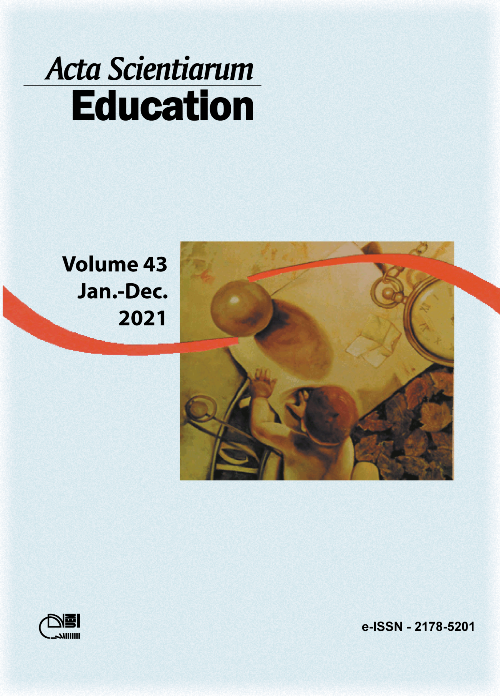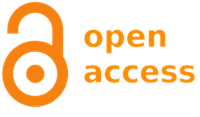Narrativas sobre la formación docente con / para tecnologías: implicaciones para las prácticas docentes
Resumen
El artículo es parte de una investigación doctoral y tiene como objetivo analizar algunas implicaciones de una educación continua titulada ‘Programación y aprendizaje con scratch’ en las prácticas de los docentes. Esta es una investigación y capacitación, en la que analizamos las narrativas producidas por 11 maestros que administran tecnologías educativas y recursos de medios (Progetec), vinculados al Centro de Tecnología Educativa, del Departamento de Educación del Estado de Mato Grosso do Sul. A partir de las dinámicas propuestas, los maestros/Progetec fueron provocados a reflexionar y narrar sobre la formación y sus implicaciones y consecuencias en sus prácticas. Para realizar el análisis narrativo, creamos una nube de palabras utilizando la interfaz de análisis cualitativo de Iramuteq, que destacó dos roles recurrentes en el contexto de la capacitación: el del profesor y el del alumno, no tan dicotómico, jerárquico, sino desde una perspectiva de colaboración, asociación y suma, a veces mezclado, a veces complementario, a veces confuso. Los profesores/Progetec se reconocen en movimiento en el proceso inventivo de enseñanza y aprendizaje, con estrategias ambiguas y por lo tanto positivas de rupturas y continuidades. También señalan que los estudiantes ahora tienen más protagonismo y espacio de voz y participación en el contexto de las prácticas tecnológicas. Las consideraciones nos permitieron visualizar grietas y avances en la práctica de los maestros en el aprendizaje y la enseñanza con tecnologías, específicamente con el lenguaje de programación Scratch.
Descargas
Citas
Alves, N. (2010). A compreensão de políticas nas pesquisas com os cotidianos: para além dos processos de regulação. Educação e Sociedade, 31(113), 1195-1212. doi: 10.1590/S0101-73302010000400008
Bondía, J. L. (2004). Notas sobre narrativa e identidad (a modo de presentación). In M. H. M. B. Abrahão (Org.), A aventura (auto)biográfica: teoria e empiria. Porto Alegre, RS: EdiPUCRS.
Carmela, R., & Haguenauer, C. J. (2012). Narrativas digitais, narrativas cinematográficas e o olhar do contador de histórias. Revista Hipertexto, 2(1), 54-67.
Cassiano, M., & Furlan, R. (2013). O processo de subjetivação segundo a esquizoanálise. Psicologia & Sociedade, 25(2), 373-378.
Cope, D. G. (2014). Computer-assisted qualitative data analysis software. Oncology Nursing Forum, 41(3), 322-323. doi: 10.1188/14.ONF.322-323
Costa, M. N. (2017). Ensaios no Feminino. São Paulo, SP: Liber Ars.
Deleuze, G., & Guattari, F. (1995). Mil platôs: capitalismo e esquizofrenia (2a. ed.). Rio de Janeiro, RJ: Editora 34.
Deleuze, G. (2012). Empirismo e subjetividade: ensaio sobre a natureza humana segundo Hume. São Paulo, SP: Editora 34.
Diniz-Pereira, J. E., & Zeichner, K. M. (2011). A pesquisa na formação e no trabalho docente (2a. ed.). Belo Horizonte, MG: Autêntica.
Freire, P. (1975). Educação como prática da liberdade (6a. ed.). Rio de Janeiro, RJ: Paz e Terra.
Gomez, M. V. (2015). Pedagogia da virtualidade: redes, cultura digital e educação. São Paulo, SP: Edições Loyola.
Guazzelli, D. C. H. R. (2015). Inovações pedagógicas com o uso de tecnologias. In M. V. Gomez & M. Franco (Orgs.), Círculo de cultura Paulo Freire: arte, mídia e educação (p. 65-72). São Paulo, SP: Fundação Memorial da América Latina.
Josso, M.-C. (2007). A transformação de si a partir da narração de histórias de vida. Educação, 3(63), 413-438.
Kenski, V. M. (1998). Novas tecnologias: o redimensionamento do espaço e do tempo e os impactos no trabalho docente. Revista Brasileira de Educação, 8, 58-71.
Paula, M. C., Viali, L., & Lima, V. M. R. (2017). Compreensões dos professores: sobre o uso das tecnologias educacionais (TE). In M. I. Cebreiros, P. Membiela, N. Casado, & M. Vidal (Eds.), La práctica docente en la enseñanza de las ciências (p. 77-80). Ourense, ES: Educación Editora.
Rebolo, F., & Brostolin, M. R. (2015). Os encantamentos da docência na voz de professoras iniciantes na educação infantil. In 37ª Reunião Nacional da Anped (p. 1-14). Florianópolis, SC: Anped.
Stake, R. E. (2011). Pesquisa qualitativa: estudando como as coisas funcionam. Porto Alegre, RS: Penso.
Valente, J. A. (1997). O uso inteligente do computador na educação. Pátio - Revista Pedagógica, 1(1), 19-21.

This work is licensed under a Creative Commons Attribution 4.0 International License.
DECLARACIÓN DE ORIGINALIDAD Y DERECHOS DE AUTOR
Declaro que este artículo es original y no ha sido presentado para publicación en ninguna otra revista nacional o internacional, ni en parte ni en su totalidad.
Los derechos de autor pertenecen exclusivamente a los autores. Los derechos de licencia utilizados por el periódico son la licencia Creative Commons Attribution 4.0 (CC BY 4.0): por lo tanto, se permite compartir (copiar y distribuir el material en cualquier medio o formato) y adaptar (remezclar, transformar y crear material a partir del contenido). licencia para cualquier propósito, incluidos fines comerciales).
Se recomienda leer este enlace para obtener más información sobre el tema: proporcionar créditos y referencias correctamente, entre otros detalles cruciales para el buen uso del material licenciado.













































